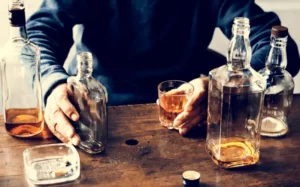
Examples of these medications include sleep aids, such as zolpidem and eszopiclone, and benzodiazepines, such as diazepam and alprazolam. Even drinking alcohol alcohol poisoning while taking over-the-counter antihistamines can be dangerous. Someone who is “just drunk” will be slurring their words, stumbling around, and acting drowsy.
Medical Professionals
Call 911 if someone you know is experiencing an alcohol overdose. Your doctor can diagnose alcohol poisoning based on your symptoms. They’ll also order blood and urine tests to check your alcohol levels. Your liver usually does a good job of keeping alcohol’s toxins from getting into your bloodstream.
Can the Stomach be Pumped for Alcohol?

After receiving medical intervention, they will continue to have severe hangover symptoms until their condition becomes more stable. In other words, your friend who drank way too much may not just be sleeping it off. If they are experiencing an episode of acute alcohol poisoning, their condition could lead to coma and even death if you do not intervene. Consuming too much alcohol too quickly can lead to alcohol poisoning, which is marked by symptoms such as poor coordination, hypothermia, irregular heartbeat, slowed breathing, and unconsciousness. At this stage, a man might have consumed three to five drinks in an hour, or two to four drinks for a woman.
What are the symptoms of alcohol intoxication?
Emergency medical attention is necessary at this point to avoid death and severe health problems. If you suspect an alcohol overdose and the person is unconscious, do not leave them alone. You don’t https://ecosoberhouse.com/ need to have all of the symptoms listed above to have an alcohol overdose. If someone’s breathing has slowed to less than eight breaths per minute — or if they can’t be woken up — call 911.
- In the U.S., paramedics don’t charge for a visit unless the person needs to go to the hospital.
- What tips the balance from drinking that produces impairment to drinking that puts one’s life in jeopardy varies among individuals.
- You don’t need to have all of the symptoms listed above to have an alcohol overdose.
Even if the person survives, an alcohol overdose like this can lead to long-lasting brain damage. Get medical help straight away for signs and symptoms of alcohol overdose. As with other drug overdoses, treating alcohol poisoning requires hospitalization for the careful monitoring of vital functions while the body rids itself of alcohol. Seek immediate medical care (call 911) for any of the symptoms of alcohol poisoning listed above. A person does not need to exhibit all of these symptoms to be in danger of dying or sustaining permanent brain damage. Treatment for alcohol intoxication, poisoning, and overdose typically takes place in the emergency care setting and is supportive, which means it is designed to help manage symptoms and avoid complications.

In the emergency room, a doctor will check their BAC and look for other signs of alcohol poisoning, such as a slow heart rate and low blood sugar and electrolyte levels. Genetic, psychological, social and environmental factors can impact how drinking alcohol affects your body and behavior. Theories suggest that for certain people drinking has a different and stronger impact that can lead to alcohol use disorder. Unlike lung damage, brain damage is more difficult to detect because it’s not always obvious in symptoms or with imaging after a one-time binge-drinking episode, she adds.
What are the possible complications of alcohol poisoning?

Young adults are more likely to drink excessively, leading to an alcohol overdose. If you drink more than this and your body isn’t able to break it down fast enough, it accumulates in your body. Celebrating at parties, cheering a favorite sports team, and enjoying get-togethers after work are common ways to relax or be with friends.
Although people can safely consume alcohol without experiencing immediate adverse health effects, long term alcohol consumption can jeopardize overall health. This is when BAC may increase to dangerous levels if the person does not receive emergency care. As BAC increases, so do alcohol’s effects on a person’s body and motor functions.
- Alcohol poisoning typically happens when you consume a large amount of alcohol in a short amount of time.
- When this happens, your body might go from taking 12 to 20 breaths per minute to less than eight breaths.
- Alcohol poisoning is severe or life threatening impairment.
Critical Signs and Symptoms of an Alcohol Overdose
- Even drinking alcohol while taking over-the-counter antihistamines can be dangerous.
- Calling 911 and keeping your friend safe until help arrives is the first step to safely treating someone with alcohol poisoning.
- Anyone who consumes too much alcohol too quickly may be in danger of an alcohol overdose, also called alcohol poisoning.
- Symptoms of alcohol poisoning typically correspond to blood alcohol concentration (BAC) levels.
- Every person is different, so there’s no way to know how much you can drink before you’re at risk of alcohol poisoning.
If you think someone has alcohol poisoning, get them medical help as soon as possible. It can be hard to decide if you think someone is drunk enough to need medical help. But it’s best to take action right away rather than be sorry later. You may worry about what will happen to you or a friend or family member, especially if underage. But the results of not getting help in time can be far more serious.
